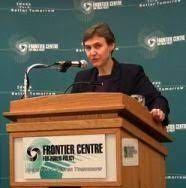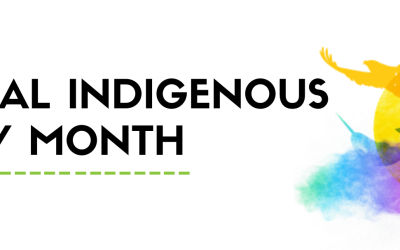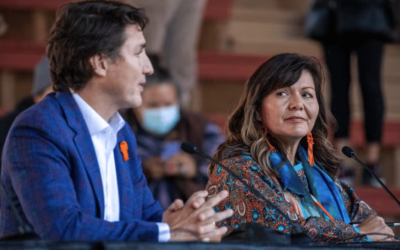Frontier Centre: Many First Nations leaders and academics present Aboriginal self-government and evolution as a panacea of problems besetting Aboriginal communities. Why do you disagree with this type of thinking?
Frances Widdowson: Because it doesn’t really address the developmental gap that is at the heart of the problems facing Aboriginal peoples. And it especially doesn’t address the unviability of many Aboriginal communities. Aboriginal communities didn’t arise out of economic processes; they were created as transitional areas where it was hoped that Aboriginal people would obtain the skills to participate in Canadian society. As a result, there’s no possibility for most aboriginal communities to become viable, and self-government is going to do nothing to address that problem.
FC: How does, what you call, the developmental gap contribute to so-called Aboriginal problem in Canada?
FW: The developmental gap prevents Aboriginal people from having the attitudes, values and disciplines that they need to participate in modern society and this is what’s maintaining the dependency and social dysfunction in Aboriginal communities today.
FC: In your book Disrobing the Aboriginal Industry you criticize the Aboriginal industry, the layer of non- Aboriginal lawyers and consultants who grow rich from the land claims process etc. What are the problems with this industry and can its influence be changed?
FW: The problem with the Industry is that it exists because of Aboriginal dependency. Therefore, the Industry doesn’t really have an interest in trying to address that dependency. In fact, it proposes programs that maintain Aboriginal dependency, ensuring that the funds keep flowing. To get rid of the Aboriginal Industry, the funding diverted to it has to be withdrawn; pressure must be placed on the government to provide high quality and sensitive services to the native population, instead of offloading its responsibility to the Aboriginal Industry.
FC: In your book you mention that economic development is very difficult, if not impossible, on many reserves due to a lack of a viable economy and opportunity. What should be done with these unviable reserves? Should they be shut down?
FW: They shouldn’t be shut down because there are many people who live in Aboriginal communities who have no capacity to participate in modern society. What needs to happen is that Aboriginal people should be given the choice to participate in modern occupations. Many aboriginal people live on reserves not because they want to, but because they lack the cultural prerequisites to enter into the modern workforce. Once they develop these capacities they will eventually migrate to urban centres, as is occurring throughout the world, and the reserves will wither away.
FC: What can be done to minimize or address the cultural gap between First Nations and the mainstream?
FW: Educational programs are the main area where work needs to be done. But there are a variety of social services, specifically tailored to aboriginal circumstances, which will have to be developed to address the unique problems that the native population is currently experiencing.
FC: What extent is historical revisionism by Aboriginal leaders and academics preventing an honest debate about Aboriginal issues?
FW: It is having a major impact. There’s a lot of romanticism that exists about Aboriginal cultures, and this justifies the argument that Aboriginal people should revitalize their traditions to solve current problems. If there was a more realistic assessment of what the historical circumstances of Aboriginal people were actually like, few would be advocating a return to the past.
FC: In some predictable quarters, academia, you are being called racist for even looking at Aboriginal culture. With some political scientists even calling your work “hate speech”. How do you respond to these criticisms?
FW: I think that this is the tactic that’s being used to stop debate on the subject. The personal attacks must be faced head on. Members of the Aboriginal Industry have to be forced to show how the ideas of Albert Howard and myself are racist or hateful, which they have never substantiated. It’s something that has to be worked through before we can actually have an intellectual debate on the subject of cultural differences.
FC: Most criticisms of the Aboriginal industry usually come from traditionally conservative elements in society yet you identify yourself with the left. What does it say that even leftists are noticing these problems with Aboriginal policy?
FW: I think it indicates the truth of what’s being said. The fact that there are different ideological perspectives all making the same observations is an indication that our viewpoints aren’t being tainted by ideology and that they actually represent a realistic assessment of the problems that we all are seeing.
FC: You criticize the inclusion of Aboriginal traditional knowledge in public policy decision making. How is this knowledge misdirecting public policy, particularly in the environmental policy? And is there ever a legitimate way to use such knowledge?
FW: It should be stated first that traditional knowledge is a combination of basic observations and spiritual beliefs. The real problem comes when spiritual beliefs are included in environmental assessment and environmental management because there is no way to verify those beliefs and determine whether they are true. The observations can be brought in, to some extent, for basic things such as where to find caribou and those kinds of questions. But they can’t be used to understand the impacts of industrial development, for example, because there was little economic impact on the environment in Aboriginal traditions. This means that aboriginal cultures can’t have observational knowledge that could apply to circumstances that are a product of modern economic processes.
FC: You are generally opposed to the inclusion of traditional culture within the education curriculum. What is wrong with including it and what ways can Aboriginals be brought into the education system so that they can succeed?
FW: Aboriginal traditions can be brought in if they are not inconsistent with scientific educational methods. It is the unscientific ideas that are being promoted, which is the problem. Things like creationism and animistic beliefs about animals talking to people, and so on. If Aboriginal people want to believe these things, they have the right to do so. But it is very destructive for non-Aboriginal people to encourage that these ideas be brought in and taught as knowledge in the educational system.
FC: What are the problems with the creation of a parallel society with separate programs for Aboriginals? How can First Nations society be brought closer into the mainstream so that we can overcome our differences?
FW: The problem with a parallel society is that it creates conflict between those societies that live separately. If you have one set of laws that apply to one group and another set of laws that apply to another they have no way of seeing the commonality that exists between them. Claims about the existence of aboriginal rights reinforce the idea that Aboriginal people are completely different and special. To some extent it’s actually a racist idea that they are so different, so racially different, that integration into a larger society that includes all cultural groups isn’t possible. What can be done to overcome these differences is to develop programs to aid the transition from Aboriginal people’s traditions to modern society. Then they will have the capacity to enter into the wider society and participate in it if they choose to do so.
FC: Some people like Jean Allard, a Métis from Manitoba, propose giving treaty payments to individual First Nations members to avoid band councils and the occasional corruption associated with them. What do you think about these kinds of ideas?
FW: I don’t think they are going to be affective in addressing Aboriginal deprivation. If you just give monetary transfers directly to Aboriginal people what happens is that the money gets spent on pickup trucks and, in the worst case scenario, gambling and drugs. It doesn’t do anything to address the developmental problems that exist in Aboriginal communities. So what needs to happen is that the funding should go to those programs that will be effective in helping Aboriginal people to develop an education or have better health or better housing, and then they will be able to participate more effectively in the wider society.
FC: Are you an optimist or a pessimist going forward on this journey?
FW: I guess I’m a realist. I’m neither an optimist nor a pessimist. I think that right now I’ve seen more movement on the Aboriginal question than ever before. I think that the shutting down of debate that has happened in the past, it’s worked for a number of reasons, but the fact that you now have another ideological perspective that’s coming forward and criticizing Aboriginal policy will be very helpful in reinforcing the idea that there are significant problems with the existing policy direction. If we are able to get past all the smear tactics and accusations, the actual ideas will be able to be discussed and I think that it’s possible that the truth will come out. The Aboriginal Industry and its supporters don’t really have any legitimate arguments. Otherwise, we would have heard something convincing by now but we haven’t. All we’ve heard are various insults and statements that people don’t think like that anymore.
FC: So you think we’ll go beyond “the shoot the messenger” stage?
FW: That’s right. Well it hasn’t happened yet, obviously, but the fact that our book was published and that people are listening to what’s being said, to some extent, is a positive development. Where it’s going to go in the future will be interesting to see. But I think that something new is now happening, and this wasn’t happening before.
Read in PDF format here.



